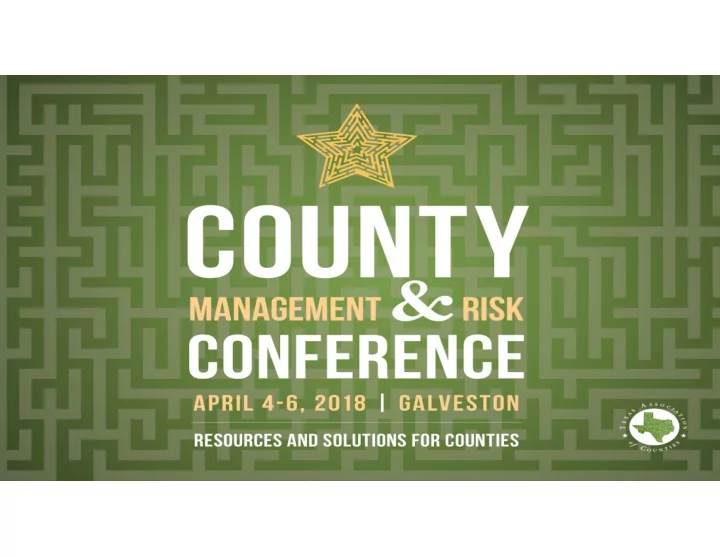

Protecting Your Property: Protecting Your Property: How How Well Do You Know Your Well Do You Know Your Fire Fire Systems Systems Joe Szewczyk, Risk Control Consultant Joe Szewczyk, Risk Control Consultant
Objectives • Where regulations related to fire systems come from • Who enforces the laws related to fire system installation, maintenance, and testing • What the different components that make up a fire system
Objectives • Review testing and inspection requirements and frequency for components of your fire system • Discuss the benefits of different components of fire systems • Discuss the importance of prevention relating to protecting your property
General Information • NFPA • TSFMO • Extinguishers • Licensing • Alarm • AHJ • Sprinkler • NOI • Suppression • Installation • Maintenance
Fire Systems Overview • Detection and Notification Fire Alarm Fire Alarm Systems Systems • Water Based Fire Sprinkler Sprinkler Protection Systems Systems Fire Systems • Chemical Based Fire Suppression Suppression Systems Systems Protection • Portable Extinguisher Fire Fire Extinguishers Extinguishers Protection
Fire Extinguishers • First line of defense Minimum standard • Size • Shape • Labeling
Extinguisher General • No universal ext • Classifications • Training • Fire Safety Training • Bullox Simulator • 911 • Fire Alarm • Fight/Flight
Extinguisher General • Inspections • Annual/Monthly • Tags/Seals • Service • Signage • Mounting
Fire Alarm Systems • FACP • Signals • Alarm (Red) • Trouble • Supervisory • Ground Fault
Fire Alarm Systems • Inspection Tags • Blue • Yellow • Red • White • Frequency • Monitoring
Fire Alarm Systems • Initiating Devices • Smoke Detector Smoke Heat • Pull Station Detector Detector • Heat Detector • Sprinkler • Duct Detector Sprinkler Pull Station
Fire Alarm Systems • Notification Devices • Strobes • Speakers • Horns • Beacons • Evacuation Strobe Speaker Strobe • Alarm detected
Fire Alarm Systems • Control Functions • Power Relays • Door/Fan Controls • Suppression Release • AHU Shutdown • Elevator Recall
Fire Sprinkler Systems
Fire Sprinkler Systems Roof The Main and Primary Branch lines are also called 3rd Floor Risers because they rise up through the floors 2ndFloor Sprinklers are like the leaves – They can be anywhere 1 st Floor along the branch, but are the final extension – The endpoint Secondary Branch Branch Main Trunk Primary Branch
Fire Sprinkler Systems • Sprinkler Heads • Glass Bulb • Solder Link • Control Valves • Reporting
Fire Sprinkler Systems • Wet Systems • Uses • Anti Freeze Loop • Testing • Maintenance • Internal ‐ 5 yrs • Gauges
Fire Sprinkler Systems AIR • Dry Systems • Uses • Deluge • Testing • Maintenance • Internal ‐ 3yrs • Gauges WATER
Fire Sprinkler Systems • Pre Action Systems • Uses • vs. dry system • Testing • Maintenance • Internal ‐ 3yrs • Gauges
Protection – Sprinkler Systems • Inspection Tags • White • Yellow • Red • Valves • Signs
Fire Sprinkler Systems All fire sprinkler systems have means of isolation, via valve control. There are numerous types of control valves: Underground “Curb” Valves – Covers painted Red Used to isolate Fire Hydrants and Fire Loop Supply lines PIV – “Post Indicator Valves” Named because they show OPEN or SHUT in the window “Tamper” control valves are used once the supply line comes out of the ground. Called Tamper valves because they are supervised by the fire alarm system.
Fire Sprinkler Systems Valves are located throughout the sprinkler system, for isolation without rendering the entire system in an isolated state. Roof 3rd Floor 2ndFloor 1 st Floor
Fire Suppression Systems
Fire Suppression Systems
Fire Suppression Systems • Uses • Testing • Maint • 6 mo • Links • Hydro
Risk Control Consultants Northwest Risk Control Jack Coffey 512 ‐ 924 ‐ 4773 Northeast Risk Control Isaac Garcia 512 ‐ 573 ‐ 6596 Southwest Risk Control Larry Boccaccio 512 ‐ 924 ‐ 4769 Southeast Risk Control Joe Szewczyk 512 ‐ 815 ‐ 7869
Questions?
Recommend
More recommend